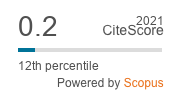Efectos de la presión hiperbárica en el estrés oxidativo en sujetos saludables
Palabras clave:
biomarcadores, catalasa, descompresión, radicales libres, voluntarios saludables, malondialdehído, estrés oxidativo, superóxido dismutasa.Resumen
Introducción: En la condición de presión hiperbárica, la presión parcial de los componentes del aire se encuentra aumentada, incluida la del oxígeno. Esto se considera la causa de formación de radicales libres y el estado de estrés oxidativo.
Objetivo: Determinar los efectos de la presión hiperbárica sobre estado del estrés oxidativo en individuos sanos.
Métodos: 29 hombres sanos realizaron buceo estandarizado en cámara hiperbárica, a una profundidad de 30 metros de agua, durante un tiempo total de 30 minutos. Se recogieron muestras de sangre antes de la compresión, inmediatamente después de la descompresión y una hora después. Se midieron los niveles de malondialdehído, catalasa y superóxido dismutasa en muestras de sangre.
Resultados: La acción del malondialdehído se incrementó inmediatamente después del buceo y se recuperó en 1 hora. La acción de enzima superóxido dismutasa se encontró disminuida al término y 1 hora después, mientras la enzima catalasa se demostró lo contrario y aumentó significativamente en la primera hora.
Conclusión: El cambio de los marcadores biológicos malondialdehído, catalasa y superóxido dismutasa sugiere estado de estrés oxidativo bajo la influencia de presión hiperbárica.
Descargas
Citas
2. Bin-Jaliah I, Dallak M, Haffor ASA. Effect of hyperoxia on the ultrastructural pathology of alveolar epithelium in relation to glutathione peroxidase, lactate dehydrogenase activities, and free radical production in rats, rattus norvigicus. Ultrastruct Pathol. 2009; 33:112-22. DOI: 10.1080/01913120902889179
3. Jamieson D, Chance B, Cadenas E, Boveris A. The relation of free radical production to hyperoxia. Annu Rev Physiol. 1986; 48:703-19. DOI: 10.1146/annurev.ph.48.030186.003415
4. Pott F, Westergaard P, Mortensen J, Jansen EC. Hyperbaric oxygen treament and pulmonary function. Undersea Hyperb Med. 1999 [access: 01/09/1999]; 26(4):225-28. Available from: https://pubmed.ncbi.nlm.nih.gov
5. Ferrer MD, Sureda A, Batle JM, Tauler P, Tur JA, Pons A. Scuba diving enhances endogenous antioxidant defenses in lymphocytes and neutrophils. Free Radic Res. 2007; 41(3): 274-281. DOI: 10.1080/10715760601080371
6. Sureda A, Batle JM., Ferrer MD, Mestre-Alfaro A, Tur JA, Pons A. Scuba diving activates vascular antioxidant system. Int J Sports Med. 2012; 33:531-6. DOI: 10.1055/s-0031-1297957
7. Gasier HG, Fothergill DM. Oxidative stress, antioxidant defenses and nitric oxide production following hyperoxic exposures. Undersea Hyperb Med. 2013 [access: 21/05/2013]; 40(2):125-34. Available from: https://pubmed.ncbi.nlm.nih.gov/23682544/
8. Kasperczyk S, Birkner E, Kasperczyk A, Zalejska-Fiolka J. Activity of superoxide dismutase and catalase in people protractedly exposed to lead compounds. Ann Agric Environ Med. 2004 [access: 11/10/2004]; 11: 291 - 296. Available from: https://www.proquest.com/openview/10c7238e1d4f603cf07810938d672190/1?pq-origsite=gscholar&cbl=5221234
9. Laher I. Systems biology of free radicals and antioxidants. Vancouver, British Columbia, Canada: Springer; 2014.
10. Bhattacharyya A, Chattopadhyay R, Mitra S, Crowe SE. Oxidative stress: an essential factor in the pathogenesis of gastrointestinal mucosal diseases. Physiol Rev. 2014; 94:329 - 354. DOI: 10.1152/physrev.00040.2012
11. Sureda A, Ferrer MD, Batle JM, Tauler P, Tur JA, Pons A. Scuba diving increases erythrocyte and plasma antioxidant defenses and spares NO without oxidative damage. Med Sci Sports Exerc. 2009; 41(6):1271-6. DOI: 10.1249/MSS.0b013e3181951069
12. Kozakiewicz M, Kędziora-Kornatowska K, Kaczerska D, Siermontowski P, Olszanski R, Krefft K. Influence of exposure in hyperbaric chambers on selected parameters of oxidative stress in professional divers. Undersea Hyperb Med. 2018 [access: 01/01/2018]; 45(1):49-54. https://europepmc.org/article/med/29571232
13. Bhutia Y, Ghosh A, Sherpa ML, Pal R, Mohanta PK. Serum malondialdehyde level: surrogate stress marker in the sikkimese diabetics. J Nat Sci Biol Med. 2011; 2(1):107-12. DOI: 10.4103/0976-9668.82309
14. Radojevic-Popovic R, Zivkovic V, Jeremic N, Sretenovic J, Velicanin N, Bradic J, et al. An evaluation of the redox state in professional scuba divers. Undersea Hyperb Med. 2015 [access: 01/09/2015]; 42(5):409-16. https://pubmed.ncbi.nlm.nih.gov/26591980/
15. Zwart SR., Kala G, Smith SM. Body iron stores and oxidative damage in humans increased during and after a 10- to 12-day undersea dive. J Nutr. 2008; 139:90-5. DOI: 10.3945/jn.108.097592
Descargas
Publicado
Cómo citar
Número
Sección
Licencia
Aquellos autores/as que tengan publicaciones con esta revista, aceptan los términos siguientes:- Los autores/as conservarán sus derechos de autor y garantizarán a la revista el derecho de primera publicación de su obra, el cual estará simultáneamente sujeto a la Licencia de reconocimiento de Creative Commons. Los contenidos que aquí se exponen pueden ser compartidos, copiados y redistribuidos en cualquier medio o formato. Pueden ser adaptados, remezclados, transformados o creados otros a partir del material, mediante los siguientes términos: Atribución (dar crédito a la obra de manera adecuada, proporcionando un enlace a la licencia, e indicando si se han realizado cambios); no-comercial (no puede hacer uso del material con fines comerciales) y compartir-igual (si mezcla, transforma o crea nuevo material a partir de esta obra, podrá distribuir su contribución siempre que utilice la misma licencia que la obra original).
- Los autores/as podrán adoptar otros acuerdos de licencia no exclusiva de distribución de la versión de la obra publicada (p. ej.: depositarla en un archivo telemático institucional o publicarla en un volumen monográfico) siempre que se indique la publicación inicial en esta revista.
- Se permite y recomienda a los autores/as difundir su obra a través de Internet (p. ej.: en archivos telemáticos institucionales o en su página web) antes y durante el proceso de envío, lo cual puede producir intercambios interesantes y aumentar las citas de la obra publicada.





